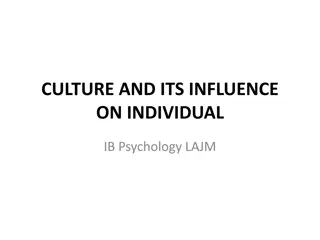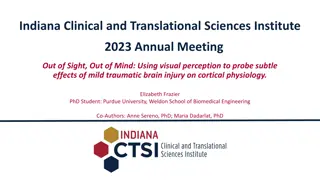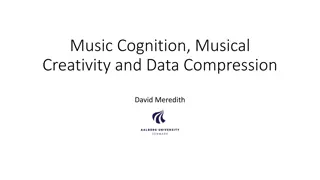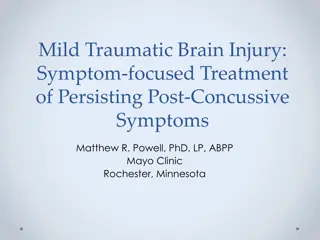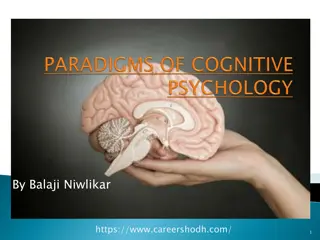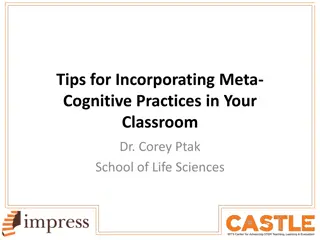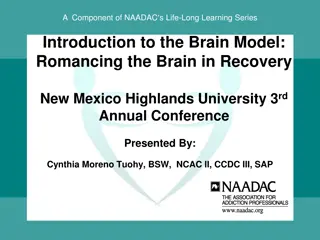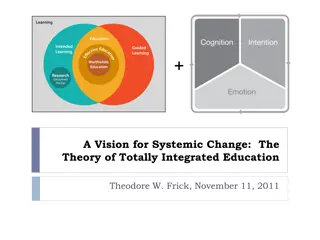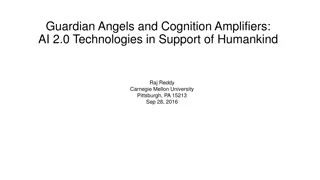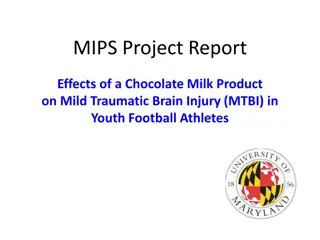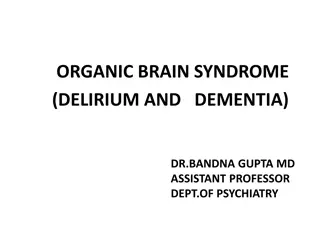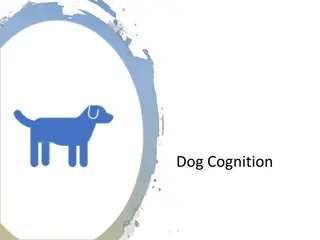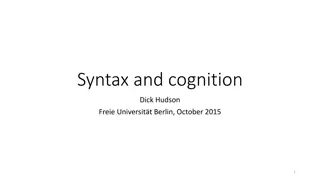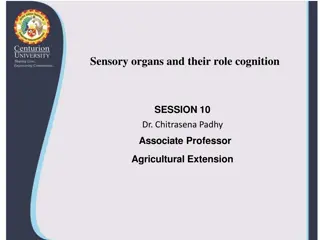
Study on Chronic Cognitive Effects After Mild Traumatic Brain Injury in LIMBIC-CENC Multicenter Research
This study conducted by the Long-term Impact of Military-relevant Brain Injury Consortium (LIMBIC-CENC) focuses on investigating altered cognition as a potential objective clinical effect after mild traumatic brain injury (mTBI). The research aims to determine long-term cognitive outcomes following mTBI among U.S. military personnel, addressing the gaps in existing literature on this subject. Various studies within the LIMBIC-CENC project, such as the Prospective Longitudinal Study, aim to shed light on the chronic effects of neurotrauma and improve understanding of cognitive impairments post-mTBI.
Download Presentation

Please find below an Image/Link to download the presentation.
The content on the website is provided AS IS for your information and personal use only. It may not be sold, licensed, or shared on other websites without obtaining consent from the author. If you encounter any issues during the download, it is possible that the publisher has removed the file from their server.
You are allowed to download the files provided on this website for personal or commercial use, subject to the condition that they are used lawfully. All files are the property of their respective owners.
The content on the website is provided AS IS for your information and personal use only. It may not be sold, licensed, or shared on other websites without obtaining consent from the author.
E N D
Presentation Transcript
1 CAN MILD TBIALTER COGNITION CHRONICALLY? A LIMBIC-CENC MULTICENTER STUDY Walker WC, O Neil ME, Ou Z, Pogoda TK, Belanger HG, Scheibel RS, Presson AP, Miles SR, Wilde EA, Tate DF, Troyanskaya M, Pugh MJ, Jak A, Cifu DX. Neuropsychology. 2023 Jan;37(1):1-19. doi: 10.1037/neu0000855. PMID: 36174184. COI, Funding Acknowledgements, & Disclaimers There are no conflicts of interest for the authors to report in association with this project or presentation. This work was supported by the Assistant Secretary of Defense for Health Affairs endorsed by the Department of Defense, through the Psychological Health/Traumatic Brain Injury Research Program Long-Term Impact of Military-Relevant Brain Injury Consortium (LIMBIC) Award/W81XWH-18-PH/TBIRP-LIMBIC under multiple awards to participating sites. The U.S. Army Medical Research Acquisition Activity, 839 Chandler Street, Fort Detrick MD 21702-5014 is the awarding and administering acquisition office. Opinions, interpretations, conclusions and recommendations are those of the author and are not necessarily endorsed by the Department of Defense or Veterans Affairs.
2 Background After Severe TBI Long-term subjective and objective long-term effects are well-established, with Severe TBI considered a chronic disease The signature long-term impairments are neurocognitive and neurobehavioral Whereas, after Mild traumatic brain injury (mTBI): Poor subjective long-term outcomes are common (i.e., PPCS in up to 20%) But objective long-term effects are not established, with significant controversy in literature Altered cognition is the leading candidate for type of objective clinical effect after mTBI However, demonstrating objective late cognitive deficits has been elusive, with inconsistencies in literature
Long-term Impact of Military-relevant Brain Injury Consortium- Chronic Effects of Neurotrauma Consortium (LIMBIC-CENC) The LIMBIC-CENC was created to study the late effects of mTBI among U.S. military personnel CENC grant: 2013-2019 LIMBIC grant: 5-yr extension Retrospective Database study (PI: Yaffe) Phenotyping study (PI: Pugh) Branches of LIMBIC-CENC Research Health Economics study (PI: Dismuke) Prospective Longitudinal Study (PI: Walker) PLS Biomarker study (PI: Kenney) PLS Imaging Study (PI: Wilde)
LIMBIC-CENC Prospective Longitudinal Study Enrollment & Testing Sites # Location Name PI Richmond Veterans Affairs (VA) Medical Center, Central Virginia VA Health Care System 01 Richmond, VA William Walker, MD Michael E. DeBakey VA Medical Center Baylor College of Medicine Randall Scheibel, PhD Maya Troyanskaya, MD 02 Houston, TX 03 Tampa, FL James A. Haley Veterans Hospital Shannon Miles, PhD 04 San Antonio, TX South Texas Veterans Health Care System Alicia Swan, PhD Fort Belvoir Community Hospital Henry M. Jackson Foundation for the Advancement of Military Medicine, Inc. 05 Ft. Belvoir, VA Mellanie Medina, MSN 06 Portland, OR VA Portland Health Care System Kathleen Carlson, PhD 07 Minneapolis, MN University of Minnesota Nicholas Davenport, PhD Sites added under LIMBIC in red font 08 Boston, MA VA Boston Healthcare System Terri Pogoda, PhD Sarah Martindale, PhD Jared Rowland, PhD 09 Salisbury, NC W.G. (Bill) Hefner VA Medical Center Amy Jak, PhD Jason Bailie, PhD 10 San Diego, CA VA San Diego Healthcare System/Camp Pendleton 11 Fort Gordon, GA Dwight D. Eisenhower Army Medical Center John Rigg, MD
Purpose of LIMBIC-CENC PLS Background: The CENC PLS established a multicenter cohort of combat-exposed current and former U.S. military service members (n > 1,500) who underwent comprehensive 3600 evaluation of brain and neurologic health and function. The LIMBIC-CENC PLS continues to expand and serially assess the cohort (current n > 2,500). Overall Goal: Answer critical questions about: the long-term effects of mild TBI, including any evidence of neurodegeneration the contribution of other factors on long-term post-deployment brain health that will lead to improved patient care and life outcomes, especially current and former military personnel
Protocol Content Highlights Establishing lifetime mild TBI history Highly standardized and quality-controlled process Mapping of all potential concussive events (PCEs) during lifetime Modification of OSU TBI-ID Interview Determining mTBI diagnosis for each PCE VCU retrospective Concussion Diagnostic Interview (VCU rCDI) Full assessment battery summary Neurocognition emphasis (traditional testing and newer I-pad based NIH Toolbox testing) Advance neuroimaging and biomarkers Co-factors and confounders (standardized questionnaires and interviews) Sensory impairments (eye tracking, audiometry, smell testing, balance testing) Converging symptom, structural, physiologic, and functional outcomes
PLS Eligibility Criteria Prior Military Combat Deployment Under CENC Post-911 deployment was required; Under LIMBIC: any era permitted Combat Exposure (CE) Deployment Related Risk Inventory (DRRI-2) combat CE module of at least 1 point Absence of TBI severity > mild (e.g. moderate or severe TBI) Both mild TBI and TBI negative (controls) are permitted Absence of Major Neurologic d/o (e.g. SCI) or Psychiatric d/o (e.g. schizophrenia) Most neuro or psych disorders are permitted (e.g. PTSD, mini-stroke)
8 Objective and Main Aim of This Analysis Objective: Examine the link between cognitive performance and remote mTBI history within the LIMBIC-CENC multicenter prospective study of U.S. military Veterans and SMs with combat exposure. Aim: Determine the contribution of mTBI history on current, objective, cognitive performance when considering comorbidities and other potential contributing factors.
9 Hypothesis for this Analysis Main Hypothesis: >= 3 lifetime mTBIs (repetitive mTBI) is associated with lower cognition as compared to those with no mTBIs (TBI negative controls). Associated hypothesis: 1-2 mTBIs will also have lower cognition vs controls Other aspects of mTBI history examined: total number of mTBIs, mechanism (blast versus blunt), and elapsed time between mTBI event(s) and time of testing
10 Study Methods Design: Cross Sectional using baseline (enrollment) assessments only (n = 1,551) Primary outcomes: From the extensive LIMBIC-CENC cognitive performance battery, we parsimoniously preselected a comprehensive/multidimensional set of tests. Exclusions: performance validity failure (MSVT, CVLT or WAIS-IV; n = 241)) TBI positive groups, non-repetitive (1-2) and repetitive (3+), were compared to TBI negative controls on each of the seven cognitive domains (n = 1,310). Multivariable regression models (n = 1,129) that adjusted for covariates P-values were adjusted for multiple comparisons.
11 Primary Outcomes; 7 cognitive domains Domain scores were computed by averaging Z-scores of component tests. Domains Component Test Scores CVLT-II: Trials 1-5 total; Long Delay Free Recall BVMT-R: Total Recall NIH-TB-CB Picture Sequence Episodic memory Attention TMT Part A Abbreviations: WAIS-IV Processing Speed Index NIH-TB-CB Pattern Comparison WAIS-IV Working Memory Index NIH-TB-CB List Sorting TMT Part B WAIS-IV Visual Puzzles NIH-TB-CB Dimensional change card sort test NIH-TB-CB Flanker Inhibitory control CVLT-II = California Verbal Learning Test-II BVMT-R = Brief Visuospatial Memory Test-Revised NIH TB-CB = NIH Toolbox Cognition Battery; TMT = Trail Making Test WAIS-IV = Wechsler Adult Intelligence Scale 4th Ed. DKEFS = the Delis Kaplan Executive Fxn System Processing speed Working Memory Executive functioning Verbal Fluency D-KEFS VFT: Letter fluency; Category fluency Fine Motor & Dexterity Grooved Pegboard: Dominant; Non-dominant
12 Unadjusted Mean (SD) Z-scores for cognitive performance No mTBI (N=256) 1-2 mTBIs (N=614) 3+ mTBIs (N=440) Episodic Memory 0.06 (0.77) -0.03 (0.78) 0.01 (0.76) Attention 0.03 (0.99) -0.05 (1.08) 0.05 (0.88) Processing Speed 0.09 (0.83) 0.00 (0.81) -0.06 (0.72) Working Memory -0.03 (0.74) -0.02 (0.78) 0.04 (0.76) Executive Functioning 0.06 (0.52) -0.05 (0.63) 0.04 (0.64) Verbal Fluency -0.07 (0.86) -0.05 (0.87) 0.11 (0.88) Fine Motor & Dexterity 0.13 (0.86) -0.02 (0.96) -0.04 (0.93) Univariate linear regression models Coefficient (95% CI) -0.09 (-0.20,0.02) p-value Adjusted p- value Coefficient (95% CI) -0.05 (-0.17,0.07) p-value Adjusted p- value Episodic Memory - 0.12 0.60 0.44 1 Attention - -0.08 (-0.22,0.07) 0.31 0.93 0.02 (-0.14,0.17) 0.83 1 Processing Speed - -0.09 (-0.20, 0.03) 0.13 0.60 -0.15 (-0.27,-0.03) 0.015* 0.09 Working Memory - 0.01 (-0.10,0.12) 0.87 1 0.08 (-0.04,0.19) 0.20 0.80 Executive Functioning - -0.11 (-0.20,-0.02) 0.013* 0.09 -0.02 (-0.12, 0.07) 0.65 1 Verbal Fluency - 0.02 (-0.11,0.15) 0.74 1 0.18 ( 0.05,0.32) 0.008* 0.06 Fine Motor & Dexterity - -0.15 (-0.29,-0.02) 0.028* 0.17 -0.17 (-0.32,-0.03) 0.020* 0.10
13 Multivariable (adjusted) linear regression models; 3+ and 1-2 mTBIs vs TBI negative controls Episodic Memory Attention Processing Speed Working Memory p-value p-value p-value p-value Coefficient (95% CI) Coefficient (95% CI) Coefficient (95% CI) Coefficient (95% CI) Variable Raw Adjust Raw Adjust Raw Adjust Raw Adjust mTBI Positive Groups versus TBI Negative Controls 1-2 mTBIs -0.06 (-0.17, 0.05) 0.26 1 -0.09 (-0.24, 0.07) 0.26 1 -0.01 (-0.12, 0.10) 0.90 1 0.02 (-0.08, 0.13) 0.70 1 3+ mTBIs -0.03 (-0.16, 0.09) 0.60 1 0.04 (-0.14, 0.22) 0.65 1 -0.04 (-0.17, 0.09) 0.54 1 0.02 (-0.10, 0.14) 0.76 1 Executive Function Verbal Fluency Fine Motor & Dexterity p-value p-value p-value Coefficient (95% CI) Coefficient (95% CI) Coefficient (95% CI) variable Raw Adjust Raw Adjust Raw Adjust mTBI Positive Groups versus TBI Negative Controls 1-2 mTBIs -0.08 (-0.16, 0.00) 0.06 0.42 0.05 (-0.08, 0.18) 0.42 1 -0.02 (-0.16, 0.12) 0.77 1 3+ mTBIs -0.04 (-0.14, 0.05) 0.022 0.39 1 0.17 ( 0.03, 0.32) 0.15 0.01 (-0.15, 0.16) 0.95 1 Summary of Findings: adjusted p values were > 0.05 on all seven prespecified cognitive domain scores
14 Covariate findings & Sensitivity analyses Covariates with effects: largest and most consistent: Age, Education, Estimated Pre-morbid intelligence Others: Gender, Race, Vestibular symptoms (Grooved Pegboard) Sensitivity Analyses (separate multivariable models with other TBI history variables) Continuous number of mTBIs Number of blast-related mTBIs Time since first and last mTBI (excluded mTBI positive only) For every TBI history variable, adjusted p values were also > 0.05 on all seven prespecified cognitive domain scores
15 Conclusions Among combat-exposed Veterans and SMs, mTBI history was not associated with performance on any cognitive testing domain when adjusting for other factors. More evidence that in unselected samples, lower cognitive performance from mTBI(s) alone does not chronically persist relative to controls Also no evidence that Blast-related mTBI has a unique deleterious chronic effect on cognition.
16 Take-home for research and clinical care Key Evidence: Remote mTBI(s) alone, even if repetitive, is not associated with objective cognitive problems in the average combat-exposed Veteran or SM Assimilation: This is consistent with the weight of the pre-existing research literature Clinical Translation: A holistic healthcare approach including comorbidity assessment is indicated for patients reporting chronic cognitive difficulties after mTBI(s), and strategies for addressing misattribution may be beneficial. Research Translation: Future study is recommended to assess phenotypes (e.g. cognitive impaired) and longitudinal decline from potential neurodegeneration.

